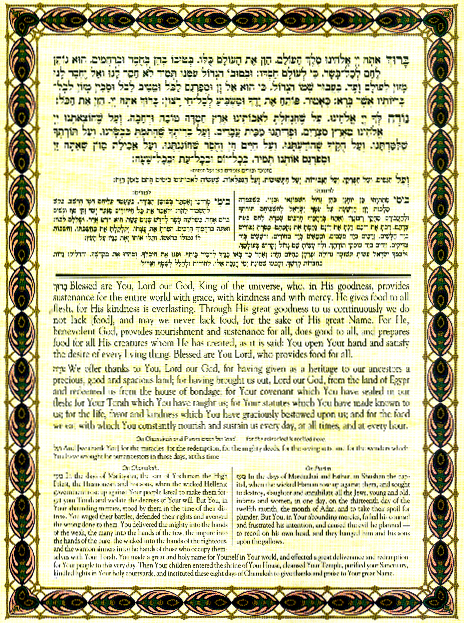

[And they say “because of your full, open, holy and wide hand, we will never be humiliated or put to shame”.

The answer contains two citations, ברוך שאמר, ועי, which I haven’t time to find yet, and this one: ( Questions and Answers on Blessing After a Meal by By Moshe Bogomilsky) Hence, it is possible here, too, that in “hakedoshah” the “kuf” is interchanged with the “gimmel” and it actually means “overflowing.” The letters gimmel, yud, chaf, and kuf (גיכ”ק) emanate from the “chaich” - “palate” - and due to their similarity they are at times interchangeable. QUESTION: It should have said, “yadecha hakedoshah” - “Your holy hand” - before describing His benevolence? It does not seem to fit between the descriptions of “open” and “generous”?ĪNSWER: In the Ba’al Shem Tov’s hand-written Siddur, which was acquired by the sixth Lubavitcher Rebbe, Rabbi Yosef Yitzchak Schneersohn, and is currently in the library of Agudat Chassidei Chabad, instead of “hakedoshah” - “holy” - it says “hegedushah” - “overflowing” - (as in “maleih vegadush” - “full and overflowing”). But then in my English search I found that someone has asked that same question to Chabad:
Birkat hamazon transliteration full#
My attempt at a Hebrew search found only a forum entry where someone said “interesting, we say gedushah” (and that was the full extend about that topic). A search for texts, transliterations or translations of Birkat haMazon didn’t yield a single version with the word gedushah (please tell me if you find one!), but many with kedusha (for example here or here). At first I thought it was a typo, but when I showed it to one of the rabbis at the table he said this that may actually be the original text and over time the unfamiliar word gedushah became replaced by the very similar sounding and more familiar word kedushah. So we have holy, kedushah (קדושה) versus overflowing, gedushah (גדושה). The other version has “your full (מלא), open (פתחה), overflowing (גדושה) and wide (רחבה) hand”. Look again at the usual text that my siddur has and all others that I had seen until then and see if you can spot the difference:

No, nothing to do with the “expected liberal/Conservative stuff” like mentioning women alongside the men or cutting out pieces that have to do with the temple. I followed the text in Hebrew and was not expecting any surprises, but there it was : Some time ago, I had the prayer book of the US Conservative movement in my hands for praying Birkat haMazon, the prayer after a meal. Once you get used to the church-y feel, it a really nice song!

Here is the text with translation from Wikipedia: There is the possibility that it sounds like a church song on purpose, to enable hidden Jews to say something like a Birkat haMazon at a time where anything Jewish was forbidden in Spain. Judge for yourself:Īfter seeing our puzzled faces, we quickly got the explanation that this is a traditional Sefardi song. And then they started to sing a church song… or at least it seemed that way to me and the other Ashkanazi guests. With a different melody and slightly differnt words, but well, that’s expected of Sefardim. At the end of the dinner, the Birkat haMazon was done. The food was bad, but plenty, the rabbi spoke about relatively relevant stuff, and although probably none of us young people was actually orthodox, we all agreed to enjoy talking without taking out our phones. They have a dinner for young people who have nowhere else to go and it is really a great place to meet people (was, at that time, anyway). I will never forget my first Shabat dinner at the synagogue of Madrid.


 0 kommentar(er)
0 kommentar(er)
